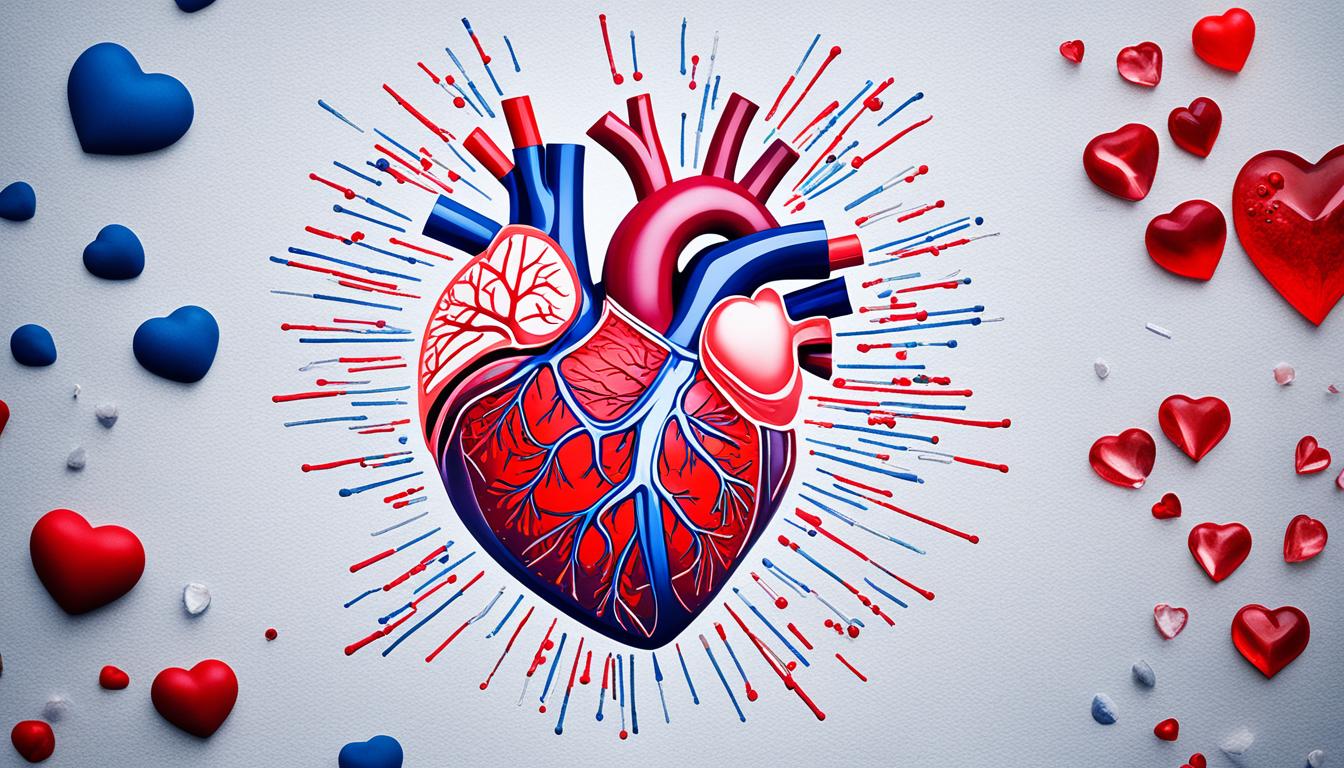Cardiomyopathy is a group of heart diseases that change the heart’s structure and function. It can cause dangerous issues like heart rhythm problems, failure, and death. There are four types: dilated, hypertrophic, restrictive, and arrhythmogenic right ventricular cardiomyopathy. Each type has unique reasons, symptoms, and treatments.
Dilated cardiomyopathy is common and often due to poor heart muscle blood flow. Hypertrophic cardiomyopathy sees the heart walls thicken, potentially causing arrhythmias. Restrictive cardiomyopathy has stiff heart muscles due to scar tissue, which makes it hard to fill with blood. Arrhythmogenic right ventricular cardiomyopathy, rare, transforms the right ventricle with fat or scar tissue. Causes can be inherited or come from other illnesses or poor lifestyle.
Key Takeaways:
- Cardiomyopathy is a group of cardiac diseases affecting the structure and functioning of the heart muscle.
- There are four main types of cardiomyopathy, each with its own causes, symptoms, and treatments.
- Dilated cardiomyopathy is the most common type, often caused by limited blood flow to the heart muscle.
- Hypertrophic cardiomyopathy is characterized by thickening of the heart walls and can lead to arrhythmia.
- Restrictive cardiomyopathy is caused by the formation of scar tissue in the heart muscle, affecting its ability to fill with blood.
- Arrhythmogenic right ventricular cardiomyopathy is a rare type where the right ventricle is replaced by fatty or scar tissue.
- Cardiomyopathy can be inherited or developed due to other diseases or lifestyle factors.
- Regular examinations are crucial for early detection and timely treatment of heart problems.
Symptoms and Prevention of Cardiomyopathy
Cardiomyopathy is a serious heart disease with various symptoms. Early on, some people might not feel sick. Finding it early is hard. But, as it gets worse, signs show up. Patients need medical help at this stage.
Recognizing Cardiomyopathy Symptoms
The symptoms of cardiomyopathy can include:
- Shortness of breath: It makes the heart pump less blood, so your body gets less oxygen.
- Chest pain: Not enough blood to your heart can cause discomfort or pain.
- Rapid heartbeat: Your heart can beat fast or irregularly, making you feel its pace.
- Swelling: Edema appears in legs and ankles when fluid builds up from poor circulation.
- Fatigue: The heart’s weak pumping can cause extreme tiredness or low energy.
- Dizziness: Less blood to the brain might make you feel dizzy or pass out.
Prevention and Lifestyle Recommendations
AHeart health is key to fighting cardiomyopathy. Even if you can’t change some risks, you can slow the disease down. Here are some tips:
- Quit smoking: Smoking hurts your heart, making cardiomyopathy worse.
- Limit alcohol consumption: Too much alcohol can damage the heart and cause cardiomyopathy.
- Avoid intense physical activities: Don’t do heavy work or sports without asking a doctor first. It can be too much for your heart.
- Manage stress levels: Too much stress is bad for your heart. Try to relax with exercises or counseling.
- Adhere to medication schedules: Take your medicines on time. It helps control symptoms and keeps your heart healthier.
Following these lifestyle changes and seeing your doctor regularly will help. You can live better and prevent more serious heart issues with cardiomyopathy.
Innovative Stem Cell Therapy for Cardiomyopathy
Stem cell therapy offers hope in treating cardiomyopathy. A study at Johns Hopkins University showed stem cells from bone marrow reduced heart scar tissue. They also improved heart pumping, benefiting patients’ lives.
Researchers at CardioCell LLC discovered something important. They found that stem cells release special factors that help repair heart cells. This means we can give stem cells through an IV, avoiding the need for risky heart injections.
For treating cardiomyopathy, stem cells are grown in a lab then reintroduced into the patient’s blood. These cells move to the heart’s damaged parts, supporting new tissue growth. This method is a breakthrough for those whose conditions do not improve with regular treatments or if they cannot get a heart transplant promptly due to a lack of donors.

